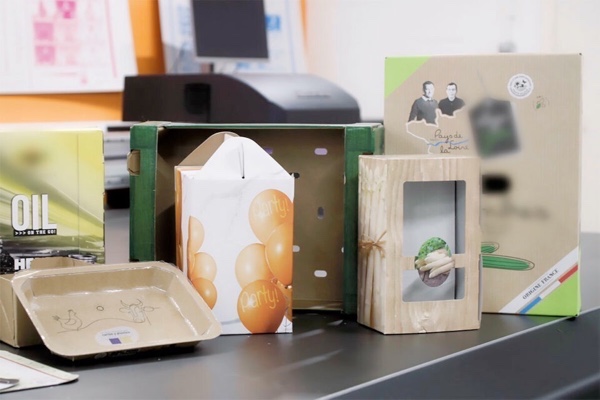Prepress
Solidus meets its sustainability goals with ECO3 technology

Monday 29. January 2024 - With the worldwide outcry for sustainability, demand for fiber-based packaging solutions is accelerating. More and more brand owners are investigating methods to move their products away from plastics in response to strong pressure from end consumers and legal constraints.
From strawberry punnets and plant pot trays to fresh food packaging and boxes for laundry tablets, switching to paper-based packaging states a brand’s green ethos in an increasingly clear way.
Supplying this market under the tagline ‘Your circular packaging partner,‘ Solidus uses recycled paper to create a variety of specialty printed and plain products for the food and beverage, advertising, consumer goods, and industrial sectors. The European packaging group’s dedication to sustainability is impressive: 90% of Solidus’ fiber input is recovered paper of which the company produced 410,000 tons of solid board in 2022.
To meet the sustainable packaging demand, Solidus needed to explore innovative ways to reduce ink consumption. The company operates 11 production plants in seven countries, purchasing a lot of offset ink. The Solidus team became intrigued when ECO3 presented the clear benefits of SPIR@L screening and SolidTune image treatment.
Combining forces for optimal results
The ECO3 SPIR@L and SolidTune technologies work exceptionally well to deliver outstanding image quality while minimizing ink usage. SPIR@L employs a straightforward yet highly effective concept: it replaces conventional round or elliptical AM ink dots in offset printing with more efficient shapes, such as spirals. This innovative process reduces ink consumption by up to 12% compared to traditional methods, resulting in a thinner ink layer that dries faster.
SolidTune, meanwhile, follows a similar principle of reducing ink consumption for solid areas, although it can be applied to solids, dots, and text. By perforating the solids with imperceptible 30-micron holes in a randomized pattern, SolidTune achieves the desired density with less ink, all without compromising image quality. Thanks to a unique edge protection algorithm, the technology preserves the edges of the dots for a crisper and cleaner print.
“The big difference in SPIR@L screening is that the spiral is not full,” explains Erik Peeters, Worldwide Marketing Manager Software Solutions at ECO3. “By changing the thickness of the line, we can apply less ink while still maintaining color density. This innovation not only reduces consumption but also addresses common printing issues, like ink smear (image slur).” He adds, “Both SPIR@L and SolidTune take advantage of dot gain to naturally close the holes, imperceptible to the naked eye.”
Big benefits and savings stack up
Solidus introduced SPIR@L and SolidTune screening at its Hoogstraten plant in Belgium in the spring of 2022. No changes to the existing setup were needed, even though ECO3 hadn’t supplied it.
Just over a year later, the packaging provider reports positive results. Less ink than anticipated is being used, both on CMYK jobs and where expensive solid Pantone colors are used. As added benefits, Solidus has also experienced improved print quality, increased production efficiency and logistics advantages.
Filip Peeters, Senior Specialist Digital Prepress at Solidus, explains, “Our ink consumption has significantly reduced. The print quality has improved and become more stable: in particular, we are experiencing fewer problems with ‘ghosting’. Because the ink layer is thinner, we have also been able to shorten the drying time and stack the pallets higher, saving floor space. All in all, we improved our production efficiency.”
Smooth deployment and full validation
The deployment of the new screening technologies went smoothly, with the testing carried out during normal production runs and then sent to ECO3 for analysis. The quality team at ECO3 selected the dot shapes with the highest savings potential and created calibration curves for Solidus. After further validation tests, Solidus was convinced that the printing quality was equal, if not better, than its standard production.
Competitive edge for future success
The Hoogstraten site that recently was food safe certified, uses a five-color KBA offset printing press, soon to be replaced with a UV-hybrid six-color press that will expand capabilities, such as being able to print a white underlayer on brown and gray solid board. Filip explains the future investment plan, “White is required more often as the demand for brown and gray cardboard increases, so we need to upgrade to maintain our competitive edge. Once that happens, we will adapt the SPIR@L and SolidTune screening to the new process. We have also started considering how the technology could reduce varnish costs, which will help us further improve our sustainability goals.”
